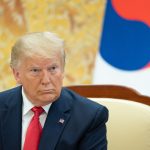In a striking display of the political theater that seems to define modern governance, the Justice Department recently threw its weight behind New York City Mayor Eric Adams, urging a judge to dismiss corruption charges against him. The implications of this kind of federal intervention are undeniable, particularly when the stakes involve a high-profile mayor’s political future intertwined with the upcoming election cycle. The mayor, claiming no wrongdoing, declared his innocence as if he were auditioning for an Oscar rather than defending against criminal charges.
The scene unfolded dramatically in a Manhattan federal courtroom where Judge Dale E. Ho was met with not just legal arguments but an ungainly mix of political maneuvering. The acting Deputy U.S. Attorney General, Emil Bove, reportedly referred to his request as an exercise of “prosecutorial discretion.” Of course, this term is loaded with its own baggage, particularly when one considers its application in a case involving a prominent Democrat. The notion that federal officials in Washington are stepping in to shield a politician from inconvenient legal troubles is bound to raise eyebrows, especially among those who have been vocally critical of the so-called “weaponization” of the justice system.
Justice Department official urges quick dismissal of criminal case against New York City mayor https://t.co/cxxAeIv2H7
— Chicago Tribune Politics (@ChiTribCloutSt) February 20, 2025
This doesn’t just seem like a run-of-the-mill legal case; it appears to be a high-stakes gamble for Adams, who has been accused of taking over $100,000 in illegal campaign contributions from foreign entities—all the while, gleefully strolling through the courtroom shaking hands with clergy members. While he might have an enthusiastic fan club among some voters, the question remains whether that will be enough to distract from the hefty allegations overshadowing his mayorship. A judge’s decision hangs in the balance, and the timeline could not be more convenient, given Adams’ looming re-election campaign.
Bove’s push to dismiss the charges not only raises eyebrows but also ushers in a chorus of dissent from prosecutors unwilling to participate in what they saw as a politically motivated cover-up. With high-ranking officials resigning left and right, one can only imagine their conversations over coffee, where they lament the activism masquerading as law enforcement. In a situation where a chorus of past federal prosecutors are crying foul, one has to wonder whether political loyalties are being prioritized over legal ethics. The increasing drama could set the stage for a reality show—”As the Courtroom Turns,” anyone?
While all this unfolds, New York Governor Kathy Hochul is left squirming in her seat, contemplating whether to toss Adams overboard to save her own political skin. This intriguing twist further spotlights the fracture lines within the Democratic Party, as power struggles rage behind closed doors. The narrative offers up a pointed reminder: amid the spectacle, the questions raised about political loyalty, corruption, and the integrity of justice are as vibrant as ever—preserving the spotlight over the chaos. In the end, whether Adams walks or faces the music, it’s evident this will not be the last time a major city finds itself navigating the murky waters of politics and justice.




